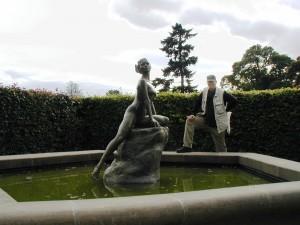The following article got my attention because it covers a topic that had just been on my mind.
My husband and I recently returned from a trip to Orlando (part business, part pleasure). While there we found an incredible restaurant/wine and jazz bar where we had a delicious meal, excellent service and great conversation.
During the evening a “middle-aged”, well-dressed, professional-looking couple came in and were seated a few tables away. Since they were in my line of sight I couldn’t help but notice them during the hour or so that they were there. The interesting part was that they probably only spoke with one another for about 10 minutes during the whole time. Didn’t they have anything else to say?
Obviously, there could have been a number of reasons they weren’t communicating (just had a fight, jet lag, etc) but my thought was “how sad.” As the following article goes on to state, we have, in many cases, lost the art of conversation.
Perhaps it’s time we brought it back!
~~~~~~~~~~~~~~~~~~~~~~~~~~~~~~~~~~~~~~~
Is the Art of Conversation Dying?
(And if so, why?)
Broadly speaking, I’d answer with “Yes.” I notice much less of this art than I did a few decades ago.
Another way I respond to this question is that “The artists of conversation are dying off, and there are fewer remaining.”
Why are they “dying off”?
As with the pandemic of obesity and poor health, if people have too little exercise and too much junk food, their health will fail. High blood pressure, diabetes, heart problems, etc.
The same is true with the art of conversation: It’s a “use it or lose it” situation.
Here are some key reasons why this art seems to be dying:
1. We live in a hurry-up world that doesn’t support lengthy conversations. The main way people learn and maintain skills in the art of conversation is the amount of time they devote to it. But if everyone’s rushing and too busy to talk, their skills suffer.
2. Conversation has been replaced by television as a form of social and family entertainment. Although you may go to the home of friends to watch a TV show or a DVD, you are less likely to pay a visit for an evening of talk. The number of hours Americans spend watching television is huge compared to the time they spend talking.
During my childhood, family friends and their kids would come for a visit and an evening of coffee and conversation. We kids would play board games or cards. Sometimes kids would just listen to the grown-ups, especially if one of them was a good story-teller. Nowadays? Not so much. In fact, almost not at all.
3. True “third places” are fewer. Not the home or the workplace, but a place that is highly accessible and free or inexpensive for food and drink such as lodges, bowling alleys, neighborhood pubs, coffee shops. At best, they’re like the bar in the classic TV show Cheers, “where everybody knows my name.”
Robert Putnam of Harvard wrote his book, Bowling Alone (2000) to describe the “The Collapse and Revival of American Community.” Since its publication I have seen a continuing collapse – but not many signs of revival.
4. My guess: Conversation skills are not valued in our society as they once were. Rarely do I hear a person described as “well-spoken,” or as a “fascinating conversationalist.” I used to hear such phrases as compliments that identified a person.
What is valued is sought after. My belief is that if conversation skill were highly valued, hundreds of courses and programs would spring up to support people to master the skill.
What can you do to maintain or grow your art of conversation?
- Participate in a book club where members discuss ideas. (Most public libraries host or know about such clubs in your community.)
- Join or form a “conversation café.” The rules for setting up such an activity are pretty simple, and get-togethers are held in local coffee shops. Check www.conversationcafe.org for details. Or form a “MasterMind Group” with a few associates to help advance toward your goals.
- Defy convention and host “an evening of conversation” at your home. Turn off the tube. Play a word game like “Fictionary” to get people talking. Or create some “Getting to Know You” conversation starters.
- Identify the smart and articulate people in your life and invite one of them for a walk or a cup of tea for the purpose of sharing your thoughts in a deeper conversation. (This can work, as philosopher Theodore Zeldin has demonstrated with his popular “Feast of Conversation” events in London where hundreds show up for the opportunity to talk about deep ideas with a complete stranger.)
Just as staying trim and fit takes some time and effort with exercising and eating wholesome food, keeping your art of conversation alive also takes a some special effort.
The Better Conversations Newsletter by Loren Ekroth. Reprinted with permission. Copyright 2010. All Rights Reserved. Dr. Loren Ekroth is the publisher of “Better Conversations” newsletter since 2002. For a free subscription to The Better Conversations newsletter visit www.conversationmatters.com
 As the little children were leaving school one day the teacher asked them to bring in their birth certificates the next day. As he was about to head off to school with it the next morning, one little boy was cautioned by his mother to be particularly careful with it since it was a very important document. But unfortunately, by the time he got to class he had lost it anyway. He began to cry.
As the little children were leaving school one day the teacher asked them to bring in their birth certificates the next day. As he was about to head off to school with it the next morning, one little boy was cautioned by his mother to be particularly careful with it since it was a very important document. But unfortunately, by the time he got to class he had lost it anyway. He began to cry.




